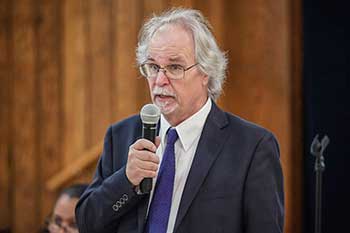Lecture to connect MLK’s philosophy and environment

The Baldwin Wallace Philosophy Department will host this year’s Marting Humanities Lecture Series entitled “Spiritual Blackout in the Anthropocene,” featuring Senior Lecturer in Philosophy Bart Schultz from the University of Chicago.
Schultz has taught at the University of Chicago for 32 years and has published numerous books in his field, including Henry Sidgwick: Eye of the Universe, which won the American Philosophical Society’s Jacques Barzun Prize in Cultural History in 2004.
Dr. Kelly Coble, chair of BW’s Philosophy Department, helped organize this semester’s Marting Lecture Series.
“I communicated the event to the PR people on campus,” said Coble, “and as I was communicating to people, there was an interest in the speaker.”
The director of another lecture series, “The Enduring Questions: The Mark Collier Lecture Series,” came into contact with Coble following this interest.
“We’re all sort of collaborating on this event,” said Coble, “because it’s more than just a talk.”
The president is going to host a reception before the talk, said Coble.
Schultz’s lecture will contribute to the conversation started by Professor Cornel West regarding the link between Martin Luther King’s philosophy and today’s environment, said Coble.
“His title “Spiritual Blackout in the Anthropocene” is really to say, we are collectively negligent because we’re not attending to the environmental reality that our actions are creating,” said Coble. “The belief that has recently been accepted is that we need to identify a new geological era to reflect the scale of the impact that we’ve had on the planet.”
Schultz’s lecture provides a call to action.
“How to apply Martin Luther King’s legacy,” said Coble. “First of all, how to revive his legacy, and then see how we can apply it to our current situation, the environmental crisis.”
Coble was familiar with Dr. Schultz’s published works before making the decision to contact him as a speaker.
“He’s a very skilled philosopher,” she said, “but he’s also provided a very authoritative history of the four figures in philosophy.”
Coble takes note of Schultz’s overall approach to philosophy.
“He’s very astute and clever in examining philosophical problems and working out solutions to those problems,” she said. “I think Schultz, a little more recently in his career, started to become much more interested in the social justice issues that he could see in the city that he is living in. He works in a big city where there’s a lot of things going on that are of national relevance.”
The University of Chicago, located in the South Side of Chicago, has not always had a good relationship with its neighbors, said Schultz.
“There was a legacy of hard feelings,” he said. “They felt that they needed to rethink the way they interacted with the surrounding communities.”
According to Schutz, a project that has helped strengthen relations between The University of Chicago and the community is the Illinois Humanities Council’s Odyssey Project. The course promotes the humanities and has been taught by Dr. Danielle Allen.
The course, he said, is geared toward “low income adults and single parents. The Civic Knowledge Project, which has been directed by Schultz, also reaches out to the Chicago community.
“I help recruit faculty and organize special events for the students,” said Schultz.
Through the Civic Knowledge Project, Schultz has collaborated with Timuel Black, a philosopher and prominent figure during the Civil Rights Movement.
“One of the best ways we’ve made an impact,” Schultz said, “was through working with Timuel Black.”
Black has met and worked with major political figures.
“He worked with Martin Luther King Jr,” said Schultz, “and helped get Harold Washington elected, who was Chicago’s first black mayor.”
Additionally, Black also mentored Barack Obama before his presidency.
“We’ve worked closely with him,” said Schultz. “It’s crucial, because he is the voice of the neighborhood.”
Schultz is the editor of Black’s recently published book, Sacred Ground: The Chicago Streets of Timuel Black.
To Schultz, the field of philosophy has historically been too preserved.
“I think academic philosophy shouldn’t be removed from the communities,” said Schultz.
“Philosophy should be more diverse and inclusive.”
Philosophy and community engagement have recently begun to overlap in Schultz’s life.
“It’s gotten harder and harder to keep the worlds apart,” he said. “Many of the philosophers I’ve worked on, you could say, are activists.”
Schultz’s lecture will further join and utilize the two worlds.
“When it comes to Ethical Theory, he said, “there is nothing more important than Environmental Philosophy.”
The lecture will take place in Gamble Auditorium, Kulas Musical Arts Building on March 20 at 7:30 p.m.
The lecture is open to the community and registration is not required.
The Exponent is looking for financial contributions to support our staff and our newsroom in producing high-quality, well-reported and accurate journalism. Thank you for taking the time to consider supporting our student journalists.










































